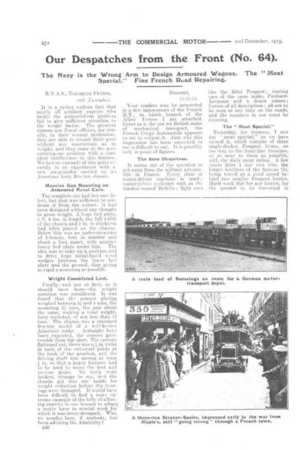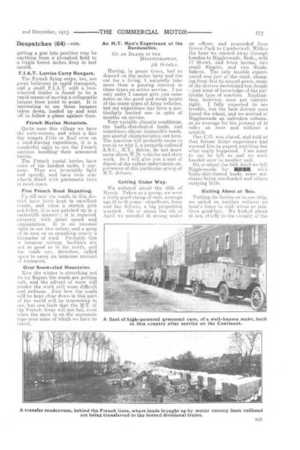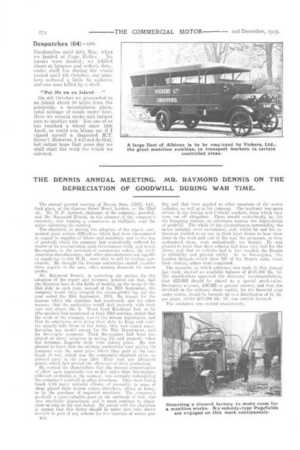Our Despatches from the Front (No. 64).
Page 12

Page 13

Page 14

If you've noticed an error in this article please click here to report it so we can fix it.
The Navy is the Wrong Arm to Design Armoured Wagons. The " Meat Special." Fine French Ruad Repairing.
R.N. A. S., NORTHE;:ni FRAN6_7E,
loth X o re mbe r.
It is a rather curious fact that nearly all artillery experts who tiekle the annoured-car problem fail to give sufficient attention to the weight factor. The greatest sinners are Naval officers, for usually, in their normal profession. they are able to mount their guns Without any restrictions as to Weight, and they come to the guncarrying-car problem with a complete indifference to this feature. We had an example of this quite recently in an experiment with a new six-pounder carried on an American lorry five-ton chassis.
Massive Gun Mounting on Armoured Naval Cars.
The complete ear had but one defect, but that was sufficient to condemn it from the outset : it had been designed without any thought to gross weight. A huge bed plate, 4 ft. 6 ins, in length, the full width of the chassis and 1 in, in thickness had ben placed on the chassis. Below this was an under-structure of I-beams, four in number and about a foot apart, with another heavy bed plate under this. The idea was to take up •a position and to drive huge nietal-faced wood wedges between the lower bcd plate and the ground, thus giving as rigid a mounting as possible.
Weight Considered Last.
Finally—and not at first, as it should have been—the weight question was considered. It was found that --the armour plating weighed between 3;', and 4 tons, the mounting 2F tons, the gun -about the same, making a total weight, lorry included, (-if not less than 12 tons. The chassis was a standard five-ton model of a well-known American make. Asomight have been expected, the chassis gave trouble from the start. The springs flattened out, there was a.1 in. twist in each of the universal joints at the back of the gearbox, and the driving shaft. was sprung at least
im so that a heavy hammer had to be used to 'move the first, and reve/ise gears. No teetlj were broken, strange to say, ard the. chassis got into our hands for weight reduction before the bearings. were damaged. It would have been difficult to find a more extreme example of the folly of allowing experts in one branch to adapti, a motor lorry to anecial work for which it was never-designed. Who, we wonder here, if anybody, has been advising the Admiralty?
B40 BELFORT, 11-11-15.
Your readers may be interested in a few impressions of the French MT., to which branch of the Allies' Forces I am attached. Great as is the use we British make of mechanical transport, the French Corps Automobile appears to me to eclipse it. Just why this impression has been conveyed to ine is difficult to say. It is possibly only in point of figures.
The Auto Ubiquitous.
It seems out of the question to get away from the military automobile in France. Every class of motor-driven machine is used ; motorcycles ; cyclecars such as the tandem-seated Bedelia ; light cars
like the Bebe Peugeot ; touring cars of the same. make, PanhardLevassor and a dozen others ; lorries of all description ; all are to be seen at any time On the roads, and the numbers in use must be amazing.
The "Meat Special." •
Yesterday, for instance, I saw the " meat special," as we have named it, which consists of three single-decker Peugeot buses, on the way to the front-line trenches, or as near • to them as -possible, with the daily meat ration. A fe* hours later I saw two 105-s, the longer brothers of the famous 75S, being towed at a good speed behind two smaller Peugeot. lorries. Hard work this for any lorries, for the ground to be traversed in
getting a gun into position may be anything from a ploughed field to a virgin forest inches deep in leaf mould.
F.I.A.T. Lorries Carry Hangars. The French flying corps, too, are great believers in rapid transport, and a small F.I.A.T. with a twowheeled trailer is .found to be a rapid means of moving a collapsable hangar from point to point. It is interesting to see these hangars taken down, loaded up and sent off to follow a plane against time.
French Marine Motorists.
Quite near this village we have the auto-canons, and when a fine clay tempts. Fritz or Karl over on a card-leaving expedition, it is a wonderful sight to see the French marines handling' their armoured lorries.
The French postal lorries have some of the hardest tasks , sup pose. They are invariably light and speedy, and have twin rear wheels fitted with pneumatic tires in most cases.
Fine French Road Repairing.
TTp till now the roads in this district have been kept in excellent repair, and when a stretch gets pot-holey, it is not patched up in a, makeshift manner ; it is repaired properly with great speed and organization. It is no unusual sight to see two rollers and a gang of 50 men or so remaking nearly a kilometre of road. Probably this is because railway facilities are not so good as in the north, and the roads are, therefore, called upon to tarry an immense amount of transport.
Over Snow-clad -Mountains.
Now the winter is stretching out its icy fingers the roads are getting soft, and the ..advent of snow will render the work. still more difficult and arduatia. JuSt how the roads will be kept. clear doWit in this part of the world will be iatereSting.to see, but one feels that the .11.T. of the French Army will not fail, even when the snow is nn the mountain tops over some of which we have to travel.
An M.T. Man's Experience at the Dardanelles.
ON AN ISLAND IN THE MEDITEIMANEAN,
4th October.
Having, in peace times, had to depend on the motor lorry and the car for a living, I naturally take more than a passing interest in these types on active service. I am only .acirry I cannot give you some notes on the good and weak points of the many types of Army vehicles, but my experience has been a particularly limited one in spite of months on service.
Very variable climatic conditions, the badly-distributed loads, and sometimes almost impossible roads, are special characteristics out here. The question will probably occur to you as to why I, a properly-enlisted A.S.C.' M.T., driver, do not know more about W.D. vehicles and their work. No I will give you a sort of digest of the rather unfortunate experiences of this particular group of
drivers.
Getting Under Way.
We enlisted about the 29th of March. Taken as a group, we were a fairly good stamp of men, average age 23 to 30 Tears—chauffeurs, lorry and bus drivers, a big proportion married. On or about the 4th of April we paraded 38 strong under
an officer, and proceeded from Grove Park to .Camberwell. Within the hour we started away through London to Biggleswade. Beds.awith 17 30-cwt. and 3-ton lorries, two small Singers, and two . Stadebakers. The only trouble experienced vir.as just at the start, changing from first to second gears, many of the drivers declutched too deeply —just want of knowledge of the particular type of machine. Explanation, however, satin put matters right. I fully expected to see trouble, hut the best drivers soon found the wheel, and we arrived at Biggleswade an unbroken column, at an average for the journey of 12 miles an hour and without a scratch.
Our CM. was elated, and told us that former bitter experience had warned him to expect anything but what really happened. I am sorry to say he left us and we were handed over to another unit.
On or about the 10th April we left Biggle,swade for UMW with badly-distributed loads, some machines being overloaded and others carrying little..
Ricking About at Sea.
Putting the lorries on to one ship, we galled on another without au hour's leave to wish wives or relatives good-bye. We kicked about at sea, chiefly in the vicinity of the
Dardanelles until 2.kh May, -when
we landed at Cape Holies. No lorries were landed ; we fiddled about at fatigues and orderly duty, under shell fire during the whole period until 4th October, our numbers reduced a little by sickness and one man killed by a shell, "Put Me on an island--" On 4th October we proceeded to an island about 10 miles from the peninsula, a mountainous place, total mileage of roads under four. Here we remain cooks and fatigue men to another unit. Not one of us has touched a wheel since 12th April, so could you blame me if I signed myself a disgusted M.T. driver ? However, I will not do that, but rather hope that some day we shall start the work for which we enlisted.




















